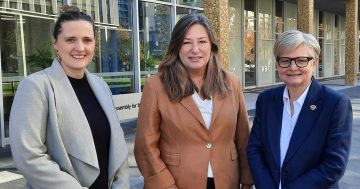
The inquiry hopes to give recommendations to improve literacy and numeracy levels of all children. Photo: Libraries ACT / Facebook.
The ACT’s “hidden or masked” disadvantage and the way it’s impacting our literacy and numeracy rates will be given a thorough look as part of a review of our education system.
Educators, academics, unions, parents and students have all been called on to comment on the consultation paper for the literacy and numeracy education inquiry.
The inquiry’s expert panel has devised 20 questions that cover what students are taught, how they are taught, how students are supported, how staff are supported, and areas that need improvement.
Chair Professor Barney Dalgarno said this presented a chance to review evidence and provide practical recommendations to strengthen the ACT’s public school system.
“[We have] begun with a focus on reviewing the data and current practices in literacy and numeracy education,” he said.
“The consultation paper is the first stage in our conversations with the ACT community, key stakeholders and experts. There are 20 questions covering key areas of interest for the panel and we will have submissions open until mid-February.
“For those not able to make a submission, the panel has developed a short seven-question survey that will enable the ACT community to share their opinions. This will support the Panel to understand local perspectives.”
The consultation paper outlines that the panel is interested in specific recommendations for each “key periods of learning”: early years (P-2), later primary (3-6), middle years (7-10) and senior secondary (11-12), as well as transition points.
The paper stated while ACT public education had a history of “innovation and excellence” with a focus on equity, there was a “persistent equity gap” between advantaged and disadvantaged students.
“The panel acknowledges both the presence of this gap and the room for additional growth in learning gain across all students in the ACT,” it noted.
“This is our challenge – how to ensure each child is achieving their maximum learning growth each year.
“We must have a sustained focus on lifting those students who need additional support, without limiting the growth of our high-performing students.”
In terms of equity, the consultation paper noted while the ACT’s population was generally highly educated and advantaged, there were elements of “hidden or masked” disadvantage, which meant the average performance in the ACT didn’t reveal the entire picture.
“The ACT has dispersed pockets of disadvantage and a relatively high cost of living,” it noted.
“The spread of social housing and the mixed demographic profile of the ACT result in many public schools with diverse student populations.”
The panel has already held meetings with principals and school system leaders, with roundtables and school visits scheduled for 2024.
“We will make time to visit schools, meet with experts, community stakeholders and families, and hear from those working in and with the system,” Prof Dalgarno said.
“The panel are looking forward to meeting with researchers and organisations in January before connecting with ACT school communities in February.”
Socioeconomic status has previously been pointed to as a reason why the ACT’s literacy and numeracy levels have been dropping.
Education and Youth Affairs Minister Yvette Berry said particularly focusing on equity would create recommendations and opportunities to strengthen student outcomes.
“We already know the ACT performs well compared to other jurisdictions, but this inquiry is a chance to review what is and isn’t working and look at success stories from around the world,” she said.
Responses to the consultation paper are due by 14 February 2024.




















